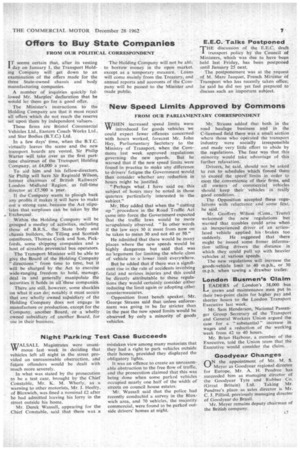New Speed Limits Approved by Commons
Page 9

If you've noticed an error in this article please click here to report it so we can fix it.
FROM OUR PARLIAMENTARY CORRESPONDENT
WHEN increased speed limits were introduced for goods vehicles we could expect fewer offences concerned with hours worked, forecast Mr. John Hay, Parliamentary Secretary to the Ministry of Transport, when the Commons last week approved regulations governing the new speeds. But he warned that if the new speed limits were found in practice to make any difference to drivers' fatigue the Government would then consider whether any reduction in hours might be justified.
"Perhaps what I have said on this subject of hours may be noted in those quarters particularly interested in the subject."
Mr. Hay added that when the "cutting up " procedure in the Road Traffic Act came into force the Government expected that the traffic laws would be more scrupulously observed. "In other words if the law says 30 it must from now on be taken to mean 30 and not 40 or 50."
He admitted that there would be many places where the new speeds would be highly dangerous but said that was no argument for limiting the whole class of vehicle to a lower limit everywhere.
But he added that if there was a significant rise in the rate of accidents involving fatal and serious injuries and this could be directly attributable to these regulations they would certainly consider either reducing the limit again or adopting other countermeasures.
Opposition front bench speaker. Mr. George Strauss said that unless enforcement was going to be far stricter than in the past the new speed Limits would be observed by only a minority of goods vehicles.
Mr. Strauss added that both in the road haulage business and in the C-licensed field there was a small section where those who operated the transport industry were socially irresponsible and made very little effort to abide by the regulations. The fear was -that this minority would take advantage of this further relaxation.
Drivers, he said, should not be asked to run to schedules which forced them to exceed the speed limits in order to meet the ,convenience of their firms, and all owners of commercial vehicles should keep their vehicles in really good condition.
The Opposition accepted these regulations with reluctance and some fear,.
he said.
Mr. Geoffrey Wilson (Cons., -Truro) welcomed the new regulations but warned that troubles could arise when an inexperienced driver of an artieu-' lated vehicle applied his brakes too suddenly. He suggested that there might be issued some firmer information telling drivers the distance in which they could pull up with heavier vehicles at various speeds.
The new -regulations will increase the goods-vehicle limit to 40 m.p.h., or 30 m.p.h. when towing a drawbar trailer.




















































































